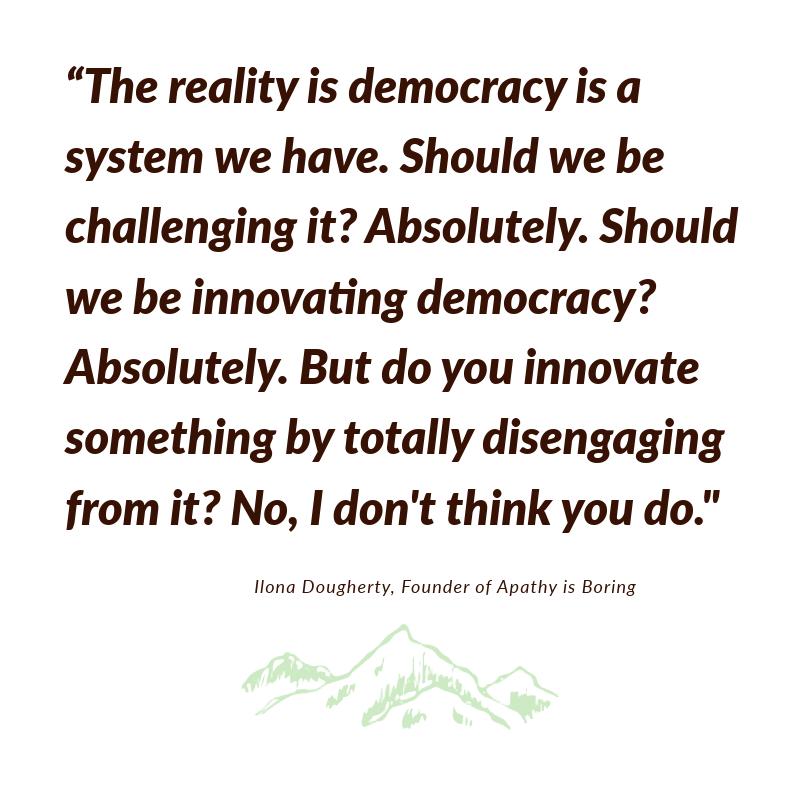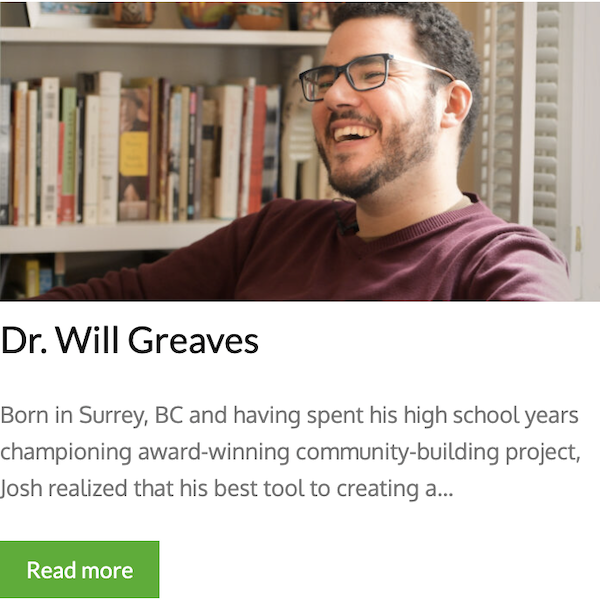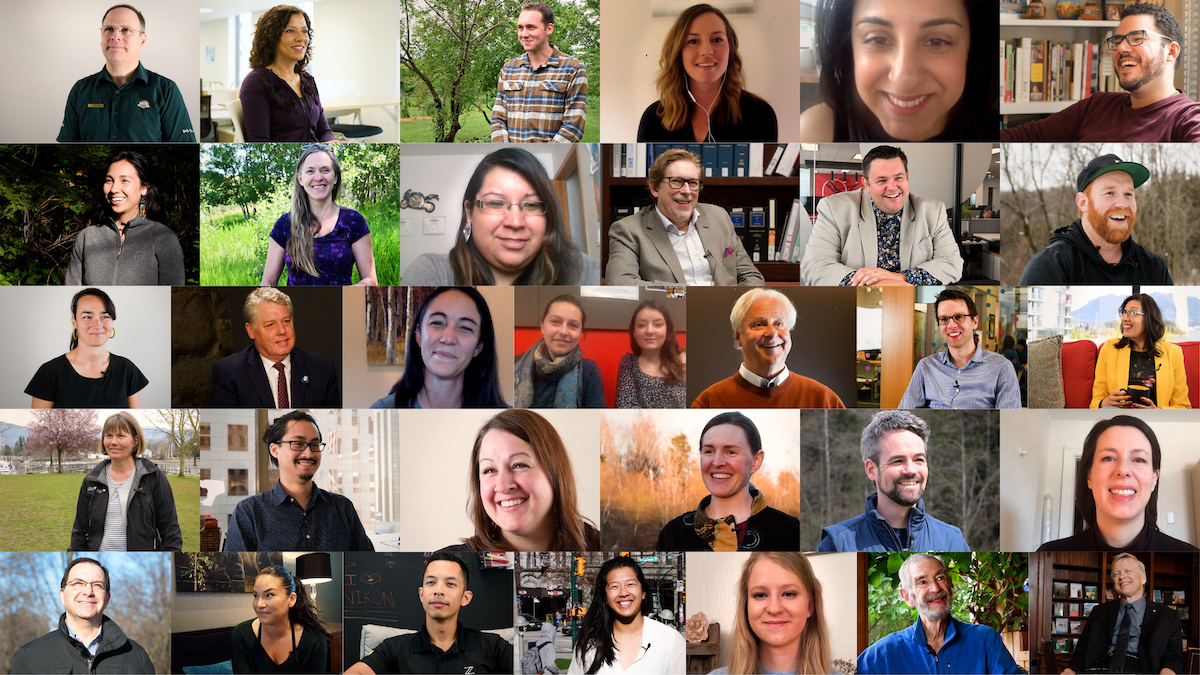The System of Things
Chapter One
“The only way to be a change maker is to be a change maker while you’re young.”
Ilona Dougherty should know.
“I grew up in in northern Canada, in rural Canada, where young people didn’t have a voice.”
But that didn’t stop Ilona.
When her parents brought her along to a meeting of a local community organization, there was a request for people to stand for election to the group’s board of directors.
“I thought, ‘I’m in the room. I want to join the board of directors.’ And, so, I put my hand up and was elected to the board of the Northern Environmental Network and that started my work.”
Ilona’s life-long work has focused on advocating for youth participation in the issues and decisions being made that affect their future. She co-founded Apathy is Boring as a rising leader and today is the co-creator of the Youth & Innovation Project at the University of Waterloo.
Throughout it all, Ilona has learned that the research is very clear.
“For young people to grow up to be healthy, engaged adults, it’s all about having a sense of purpose and being meaningfully engaged in democracy while they’re young, making change while they’re young.”
Which, again, doesn’t always seem appealing; it doesn’t always seem possible. But, Ilona says, think again.

“The reality is democracy is a system we have. Should we be challenging it? Absolutely. Should we be innovating democracy? Absolutely. But do you innovate something by totally disengaging from it? No, I don’t think you do. I think you innovate something by trying new things, but also engaging with the system and continuing to evolve it.”
In other words, Ilona argues, “the only way to change something is to engage with it.”
And Ilona has changed the system. She’s made it possible for more young people, from every corner of Canada, to have an effective voice in our politics.
“The worst thing is not recognizing the power you have.”
Ilona’s right. We all have power. But especially you. Think about this:
“This is the crazy thing about youth culture. So, young people start using the latest app – like Facebook, right? – and adults then follow along. Young people are trendsetters. And young people can be trendsetters on issues that they care about. It’s just a matter of recognizing that they have incredible power that often they’re not taking advantage of.”
When that power’s not realized, Ilona says, there’s a disconnect between caring and acting.
“Where it seems to fall down is translating those beliefs into action. Young people aren’t necessarily becoming environmental stewards to the same degree as they’re saying they care about these issues. So, that’s the challenge.”
How to shift from caring to acting, from thinking to doing? Ilona says dream big.
“Young people want to tackle big issues. Young people aren’t scared of tackling big issues. We should never be dampening people’s creativity or their belief in big ideas. We should be encouraging them. That’s what we need.”
And whether you live in an urban centre or a rural community, when you realize the power you have?
“I think it really starts with recognizing how each of us are living our values – really living our values and our lives. If we can start there, (what matters next is) seeing that you can have an impact while you’re young on something that matters to you.”
Of course, Ilona is speaking from experience.
“Growing up in the north was hard. But also I saw that resilience (in the people). I think northern Canada and rural Canada is full of resilience and creativity and just power waiting to be tapped into. And I really hope that we tap into that.”
Me too.
So, realize the power you have to advance new ideas that just might create a better balance between people and nature. But Ilona says it’s also important to remember this:
“It’s going to be really hard and you’re going to need to sit at the table with people who are terrified and made very uncomfortable by the fact that you’re there for a really long time before things change. But do it!”
Ilona’s right, argues former prime minister Kim Campbell.
“Young people paid the ultimate price to defeat fascism, to defeat the forces that did not want democracy, did not want the rule of law, did not want constraints on those in power. So, I think we have an obligation to the people who made that sacrifice.”
Exactly. As our former prime minister adds:
“We can’t all be in parliament. We have to decide what it is that we can contribute and want to contribute. And, you know, if you’re somebody who has your heart set on being a doctor, you will take a different approach to somebody who wants to get a bachelor’s degree in science and then go on into direct engagement. The thing is? Find what your passion is. Find out what you’re good at, what you feel you can do to contribute and then do it.”
Political scientist Dr. Will Greaves agrees.
“Young people can take this energy – this positivity, this desire to effect some kind of change – and through a little bit of sweat and a little bit of hard work, can really make a meaningful impact.”
That’s because what we say and what we do matters. That’s because our actions don’t just shape our lives; they determine the direction of our society.
It’s why youth advocate Ilona Dougherty adds: “Absolutely the policy process needs to change and it will change if young people stick with it and make sure that their voice is heard.”
After all, what we don’t say and don’t do also matters. When we don’t engage, nothing changes. Just ask Kim Campbell.
“I know there are a lot of people that turn their nose up at politics. They’re much more interested in getting involved in civil society organizations and I say go for it. Find where it is that your passion gets its outlet. But do not turn your nose up at government, at politics.”
She’s right. Why?
Because, again, politics is the organization of our lives. It’s our relationships, big and small. It’s in our nature, literally and figuratively. We can’t escape politics or quit it or ignore it.
So, if we can’t do away with politics, why not learn about it and participate in it and shape the future of it?
“You will also meet people living heroic lives and people doing amazing and wonderful things. Human beings are quite wonderful and it’s an honor to serve them. And you need to serve them in a way that is in the national interest, not in your own interest. And there are a lot of people for whom politics is a vehicle to enrich themselves and make themselves feel important. But if you’re not one of those people, then maybe you should elbow your way into the arena.”
Indeed, Kim Campbell.
For even when we think it’s impossible, we must remember, it’s not.




